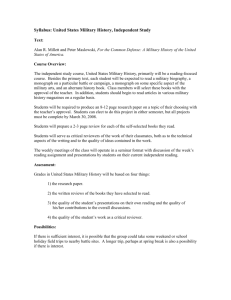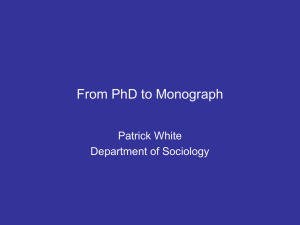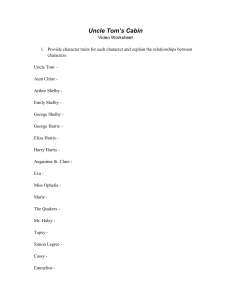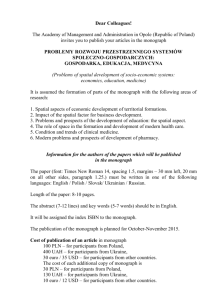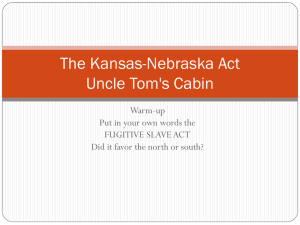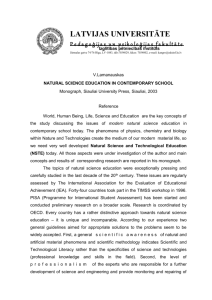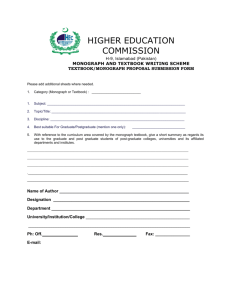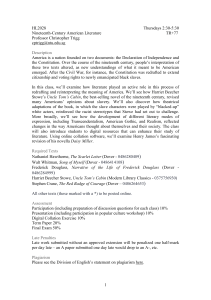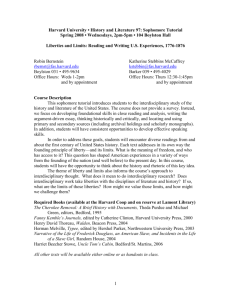The “Vanishing Red Man” and the Manifest Destiny
advertisement
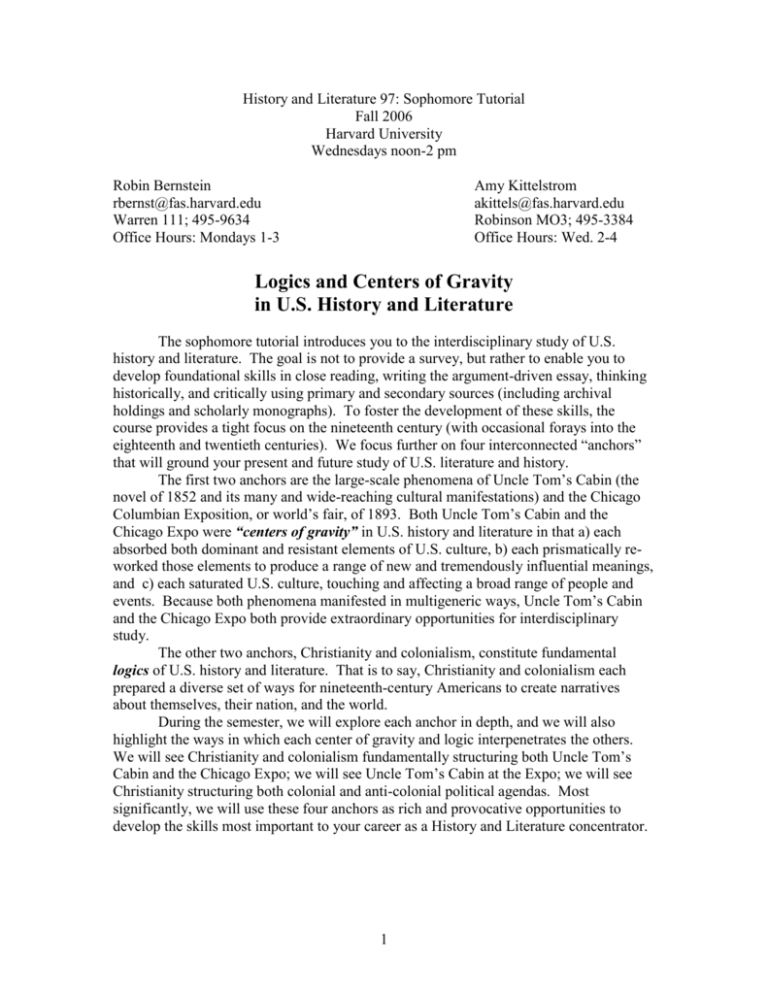
History and Literature 97: Sophomore Tutorial Fall 2006 Harvard University Wednesdays noon-2 pm Robin Bernstein rbernst@fas.harvard.edu Warren 111; 495-9634 Office Hours: Mondays 1-3 Amy Kittelstrom akittels@fas.harvard.edu Robinson MO3; 495-3384 Office Hours: Wed. 2-4 Logics and Centers of Gravity in U.S. History and Literature The sophomore tutorial introduces you to the interdisciplinary study of U.S. history and literature. The goal is not to provide a survey, but rather to enable you to develop foundational skills in close reading, writing the argument-driven essay, thinking historically, and critically using primary and secondary sources (including archival holdings and scholarly monographs). To foster the development of these skills, the course provides a tight focus on the nineteenth century (with occasional forays into the eighteenth and twentieth centuries). We focus further on four interconnected “anchors” that will ground your present and future study of U.S. literature and history. The first two anchors are the large-scale phenomena of Uncle Tom’s Cabin (the novel of 1852 and its many and wide-reaching cultural manifestations) and the Chicago Columbian Exposition, or world’s fair, of 1893. Both Uncle Tom’s Cabin and the Chicago Expo were “centers of gravity” in U.S. history and literature in that a) each absorbed both dominant and resistant elements of U.S. culture, b) each prismatically reworked those elements to produce a range of new and tremendously influential meanings, and c) each saturated U.S. culture, touching and affecting a broad range of people and events. Because both phenomena manifested in multigeneric ways, Uncle Tom’s Cabin and the Chicago Expo both provide extraordinary opportunities for interdisciplinary study. The other two anchors, Christianity and colonialism, constitute fundamental logics of U.S. history and literature. That is to say, Christianity and colonialism each prepared a diverse set of ways for nineteenth-century Americans to create narratives about themselves, their nation, and the world. During the semester, we will explore each anchor in depth, and we will also highlight the ways in which each center of gravity and logic interpenetrates the others. We will see Christianity and colonialism fundamentally structuring both Uncle Tom’s Cabin and the Chicago Expo; we will see Uncle Tom’s Cabin at the Expo; we will see Christianity structuring both colonial and anti-colonial political agendas. Most significantly, we will use these four anchors as rich and provocative opportunities to develop the skills most important to your career as a History and Literature concentrator. 1 Course Requirements The sophomore tutorial is a year-long course, and at the end of the spring semester you will receive a grade for the entire year. This full-year grade is an average of your grades from the fall and spring semesters. In the fall, your grade will be determined as follows: Classroom Participation Scholarly Monograph Précis (individual due dates) Research Assignment #1 (Due Oct. 11) Paper #1: Argument-Driven Essay (5-7 pp., due Nov. 10) Research Assignment #2 (Dec. 13) Paper #2: Research Paper (10-12 pp., due Dec. 19) 25% 10% 10% 20% 10% (full credit/no credit) 25% All books are on reserve at Lamont Library. Unless otherwise specified, all papers are due at the beginning of class on the due date. All written assignments must be submitted in duplicate. Late papers will be penalized one third of a letter grade for each day overdue. Failure to complete any assignment can lower your grade in excess of the stated percentage. Required books: Gail S. Bederman, Manliness and Civilization: A Cultural History of Gender and Race in the United States, 1880-1917 (Chicago: University of Chicago Press, 1996) Boy Scouts of America, The Official Handbook for Boys (1911; reprint, Applewood Books, 1997) Harold Frederic, The Damnation of Theron Ware (1896; reprint, New York: Penguin Classics, 1986) Online at <http://onlinebooks.library.upenn.edu/webbin/gutbook/lookup?num=133> Richard Hughes Seager, ed. The Dawn of Religious Pluralism: Voices from the World’s Parliament of Religions, 1893 (Open Court Publishing, 1993) Paul E. Johnson, The Kingdom of Matthias: A Story of Sex and Salvation in 19th-Century America (USA: Oxford University Press, 1995) Harriet Beecher Stowe, Uncle Tom’s Cabin (1852; reprint with context and criticism, ed. Elizabeth Ammons, New York: W. W. Norton and Company, 1995) Online at <http://www.iath.virginia.edu/utc/> Ida B. Wells, Frederick Douglass, et al., The Reason Why the Colored American is Not in the World’s Columbian Exposition. (1893; reprint introduced by Robert W. Rydell. Urbana, IL: University of Illinois Press, 1999) Online at <http://digital.library.upenn.edu/women/wells/exposition/exposition.html> Recommended book: Thomas J. Schlereth, Victorian America: Transformations in Everyday Life, 1876-1915 (New York: HarperCollins, 1991) Class Participation: Students will take collective responsibility for the success of every discussion. This responsibility involves three components. First, you are required to 2 arrive in class having read and thought about all the reading. In other words, merely gulping down the reading is inadequate. You should come to class having chewed and digested the material thoroughly. You are expected to prepare your own thoughts, opinions, and questions before every class. Second, you must listen actively to your classmates. Your contributions to our discussion should productively engage with your colleagues’ ideas. Third, you must express your thoughts in a respectful manner that advances our conversation. Practices that disrespect your colleagues (for example, interrupting, hogging the floor, launching personal attacks, or answering cell phones) will hinder conversation; such practices are, therefore, unacceptable. Written Assignments and Oral Presentations: The sophomore tutorial is writing intensive. In the fall, you will complete several writing and research assignments that will prepare you for your sophomore essay project in the spring semester. The assignments fall into three categories: papers, research assignments, and the scholarly monograph précis: Papers: The first paper consists of a thematic analysis with a thesis, carefully supported by textual evidence. For the second paper, you will conduct original research and present an argument that draws upon both primary and secondary sources. Research Assignments: You will complete two research assignments designed to develop skills in locating and analyzing primary sources. The first research assignment will entail writing a 1-page close reading of the primary source you have found and presenting that source to the class. The second research assignment, which will be graded full credit/no credit, will combine archival engagement with an oral presentation. Scholarly Monograph Précis: To build skills in analyzing scholarly writing, each student will read one book-length secondary source (the “monograph options” are listed in the syllabus) and will present to the class a quick summary of the book’s argument. You will also comment briefly on how the book adds to or complicates our collective understanding of U.S. history and literature. Each student will also submit a very brief (1 p.) précis summarizing the book’s argument, structure, and methodology. It is the student’s responsibility to obtain the book through the library or a bookstore. Sept. 20: Making a Man out of U.S. Frederick Jackson Turner, “The Significance of the Frontier in American History”(1893) <http://xroads.virginia.edu/~HYPER/TURNER/chapter1.html> Boy Scouts of America: The Official Handbook for Boys (1911). Focus your reading on pages x-xii, 3-12, 219-233, 237-251, 279-288, and 353-356 Sept. 27: Common Curriculum week one: The “Objects” of History and Literature E.H. Carr, “The Historian and His Facts” (1961) Terry Eagleton, “Introduction: What is Literature?” (1983) William Cronon, “A Place for Stories: Nature, History, and Narrative” (1992) Monograph option: William Cronon, Changes in the Land: Indians, Colonists, and the Ecology of New England Monograph option: Jill Lepore, The Name of War: King Philip’s War and the Origins of American Identity 3 Oct. 4: The White City Gail Bederman, Manliness & Civilization, chapters 1 and 2 Ida B. Wells, Frederick Douglass, et al., The Reason Why the Colored American is Not at the World’s Columbian Exposition (1892, ed. by Robert W. Rydell, 1999) <http://digital.library.upenn.edu/women/wells/exposition/exposition.html> William James, “Epidemic of Lynching” (1903)** Monograph option: Kirk Savage, Standing Soldiers, Kneeling Slaves: Race, War, and Monument in Nineteenth-Century America Oct. 11: Labor and Individuality Richard T. Ely, “Pullman: A Social Study” (1885): http://www.library.cornell.edu/Reps/DOCS/pullman.htm Jane Addams, “Industrial Amelioration,” Democracy and Social Ethics (1907) <http://pds.harvard.edu:8080/pdx/servlet/pds?id=2581650> Henry Adams, “The Dynamo and the Virgin” (1900): <http://www.louisville.edu/as/english/haymarket/pierce/dynamo.html> Alan Trachtenberg, “White City,” The Incorporation of America: Culture and Society in the Gilded Age (1982), 208-234 ** Research Assignment due in class Monograph option: M. M. Manring: Slave in a Box: The Strange Career of Aunt Jemima Oct. 18: Labor and Capital Selected addresses from the World’s Parliament of Religions, Chicago, 1893** Edward Bellamy, Looking Backward, 2000-1887 Monograph option: Carrie Tirado Bramen, The Uses of Variety: Modern Americanism and the Quest for National Distinctiveness Oct. 25: Whose Religion? Richard Rodriguez, selection from Hunger of Memory (1982)** Martin Luther King, Jr., “Loving Your Enemies” (1957) and “The American Dream” (1965): <http://www.stanford.edu/group/King/publications/sermons/650704_The_American_ Dream.html> <http://www.stanford.edu/group/King/publications/sermons/571117.002_Loving_Yo ur_Enemies.html > Dorothy Day, selection from By Little and By Little Monograph option: David L. Chappell, A Stone of Hope: Prophetic Religion and the Death of Jim Crow Nov. 1: Religion and the Modern Harold Frederic, The Damnation of Theron Ware (1896) Available online at <http://onlinebooks.library.upenn.edu/webbin/gutbook/lookup?num=133> Monograph option: William R. Hutchison, The Modernist Impulse in American Protestantism 4 Nov. 8: Great Awakenings Jonathan Edwards, “Sinners in the Hands of an Angry God” (1741): <http://www.jonathanedwards.com/sermons/Warnings/sinners.htm> Johnson and Wilentz, Kingdom of Matthias (1998) Monograph option: Jon Butler, Awash in a Sea of Faith: Christianizing the American People Monday, Nov. 10: Paper #1 due by 5 p.m. in Dr. Kittelstrom’s mailbox, Hist&Lit office. Nov. 15: Uncle Tom’s Cabin as Novel Harriet Beecher Stowe, Uncle Tom’s Cabin (1852), chapters 1 through 29. Available online at <http://www.iath.virginia.edu/utc/> Monograph option: Marianne Noble, The Masochistic Pleasures of Sentimental Literature 6-8 p.m. Mon., Nov. 20: Uncle Tom’s Cabin as a Phenomenon Stowe, Uncle Tom’s Cabin, chapters 30 through the end. Available online at <http://www.iath.virginia.edu/utc/> Robyn R. Warhol, “’Ain’t I de One Everybody Come to See?!’: Popular Memories of Uncle Tom’s Cabin”** Browse http://www.iath.virginia.edu/utc/index2f.html and be prepared to talk about your discoveries in connection with our class reading Monograph option: Sarah Meer, Uncle Tom Mania: Slavery, Minstrelsy, and Transatlantic Culture in the 1850s Monograph option: Eric Lott, Love and Theft: Blackface Minstrelsy and the American Working Class One-paragraph prospectus for final essay due in class; hand in two copies Nov. 29: Common Curriculum week two: Whose History? Whose Literature? Jane Tompkins, chapters from Sensational Designs (1985) Henry Louis Gates, Jr., “The Master’s Pieces: On Canon Formation and the AfricanAmerican Tradition” (1990) Harold Bloom, “An Elegy for the Canon” (1994) Monograph option: Hazel Carby, Reconstructing Womanhood: The Emergence of the Afro-American Woman Novelist Dec. 6: Uncle Tom’s Cabin as a Phenomenon: Colonialism Amy Kaplan, “Manifest Domesticity,” American Literature 70.3 (Sep. 1998), pp. 581-606. Available online through JSTOR Sarah Josepha Hale, Liberia; or, Mr. Peyton’s Experiments (New York: Harper and Brothers, 1853). “Preface,” “Liberia as It Is,” “Africa,” and “Appendix,” pp. iv-v, 202-280. Available online at <http://jefferson.village.virginia.edu/utc/proslav/halehp.html> 5 Monograph option: Amy Kaplan, The Anarchy of Empire in the Making of U.S. Culture Outline for final essay due Dec. 13: Consumer Culture and Visual Culture Selections from Godey’s Lady’s Book. Available online at <http://www.history.rochester.edu/godeys/> Research Assignment #2 presentations in class Monograph option: William Leach, Land of Desire: Merchants, Power, and the Rise of a New American Culture December 19: Final Research Paper due 6
